请仔细阅读涉及外国人来深就业创 业 相 关 法 律 问 题 !本 文 内 容 基 于现行有效法律法规规章整理。Please read carefully this article on the legal matters related to the foreigners to be employed or start businesses in Shenzhen! The content herein is based on the current effective laws and regulations.
外国人来深就业需和用人单位签订劳动合同,劳动合同是劳动者与用人单位确立劳动关系、明确双方权利和义务的协议。Foreigners who come to Shenzhen for employment need to sign labor contracts with the employers. A labor contract is an agreement between theworker and the employer to establish the labor relationship and clarify the rights and obligations of both parties.1. Foreigners coming to Shenzhen for employment need to sign labor contracts with employersLabor Contract一、外国人来深就业需和用人单位签订劳动合同劳动合同01《中华人民共和国劳动合同法》《外国人在中国就业管理规定》第七条 用人单位自用工之日起即与劳动者建立劳动关系。用人单位应当建立职工名册备查。Labor Contract Law of the People's Republic of China《中华人民共和国劳动合同法》Labor Contract Law of the People's Republic of ChinaRules for the Administration of Employment of Foreigners in ChinaArticle 7 A labor relationship is established by an employing unit with a worker as of the date the former employs the latter. An employing unit shall keep a register of workers for reference.Article 17 A labor contract shall contain the following terms:(1) name, domicile and legal representative or the principal leading person of the employing unit;(2) name, address and the number of the resident identity card or of other valid identity documents of the worker;(3) term of the labor contract;(4) job description and the place of work;(5) working hours, rest and vacation;(6) labor remuneration;(7) social insurance;第十七条 用人单位与被聘用的外国人应依法订立劳动合同。劳动合同的期限最长不得超 过 五年 。劳动 合同期 限 届满即 行 终止,但按本规定第十九条的规定履行审批手续后可以续订。2. Terms of the labor contract二、劳动合同的条款第十七条 劳动合同应当具备以下条款:(一)用人单位的名称、住所和法定代表人或者主要负责人;(二)劳动者的姓名、住址和居民身份证或者其他有效身份证件号码;(三)劳动合同期限;(四)工作内容和工作地点;(五)工作时间和休息休假;(六)劳动报酬;(七)社会保险;(八)劳动保护、劳动条件和职业危害防护;(九)法律、法规规定应当纳入劳动合同的其他事项。劳动合同除前款规定的必备条款外,用人单位与劳动者可以约定试用期、培训、保守秘密、补充保险和福利待遇等其他事项。Article 17 The employer and its foreign employee should, in accordance with law, conclude a labor contract, the term of which shall not exceed five yearsSuch contract may be renewed upon expiration after the completion of clearance process in accordance with Article 19 of these Rules.12
外国人来深工作应当取得工作许可和工作类居留证件,未按照规定取得工作许可和工作类居留证件在中国境内工作或超出工作许可限定范围在中国境内工作属于非法就业。Foreigners coming to Shenzhen for employment shall obtain a work permit and work-type residence permit. Working in China without obtaining the required work permit and work-type residence permit in accordance with relevant regulations, or beyond the scope specified in the work permit, constitutes illegal employment.Lawful Employment合法就业022. Apply for a talent visa (R) or work visa (Z)二、申请人才签证(R字签证)或工作签证(Z字签证)1. Foreigners coming to Shenzhen for work shall obtain work permits and work-type residence permits一、外国人来深工作应当取得工作许可和工作类居留证件(8) occupational protection, working conditions and protection against occupational hazards; and(9) other terms which are required to be included in a labor contract, as provided for by laws and regulations.In addition to the requisite terms mentioned above, an employing unit and a worker may agree to have other matters stipulated in the labor contract, such as probation period, training, confidentiality, supplementary insurance and welfare benefits.Article 41 Paragraph 1 Foreigners who work in China shall obtain work permits and work-type residence permits in accordance with relevant regulations. No entities or individuals shall employ foreigners who have no work permits or work-type residence permits.《中华人民共和国出境入境管理法》Exit and Entry Administration Law of the People's Republic of China《中华人民共和国出境入境管理法》Exit and Entry Administration Law of the People's Republic of China第四十一条第一款 外国人在中国境内工作,应当按照规定取得工作许可和工作类居留证件。任何单位和个人不得聘用未取得工作许可和工作类居留证件的外国人。第十五条 外国人入境,应当向驻外签证机关申请办理签证,但是本法另有规定的除外。Article 15 In order to entering China, foreigners shall apply to the visa-issuing authorities stationed abroad for a visa, except as otherwise provided for in this Law.第十六条第三款 对因工作、学习、探亲、旅游、商务活动、人才引进等非外交、公务事由入境的外国人,签发相应类别的普通签证。普通签证的类别和签发办法由国务院规定。Article 16 Paragraph 3 Appropriate types of ordinary visa shall be issued to foreigners who enter China due to non-diplomatic or official reasons including work, study, family visit, travel, business activities and talent introduction. The types of ordinary visa and relevant issuance measures shall be stipulated by the State Council.《中华人民共和国外国人入境出境管理条例》Regulations of the People's Republic of China on the Administration of the Entry and Exit of Foreigners第六条 普通签证分为以下类别,并在签证上标明相应的汉语拼音字母:(九)R字签证,发给国家需要的外国高层次人才和急需紧缺专门人才。34
4. Illegal employment and its legal consequences3. Apply for a work-type residence permit四、非法就业及其法律后果三、申领工作类居留证件《中华人民共和国出境入境管理法》Exit and Entry Administration Law of the People's Republic of China《中华人民共和国出境入境管理法》Exit and Entry Administration Law of the People's 第三十条 外国人所持签证注明入境后需要办Republic of China理居留证件的,应当自入境之日起三十日内,向拟居留地县级以上地方人民政府公安机关出入境管理机构申请办理外国人居留证件。申请办理外国人居留证件,应当提交本人的护照或者其他国际旅行证件,以及申请事由的相关材料,并留存指纹等人体生物识别信息。公安机关出入境管理机构应当自收到申请材料之日起十五日内进行审查并作出审查决定,根据居留事由签发相应类别和期限的外国人居留证件。外国人工作类居留证件的有效期最短为九十日,最长为五年;非工作类居留证件的有效期最短为一百八十日,最长为五年。第四十三条 外国人有下列行为之一的,属于非法就业:(一)未按照规定取得工作许可和工作类居留证件在中国境内工作的;(二)超出工作许可限定范围在中国境内工作的;(三)外国留学生违反勤工助学管理规定,超出规定的岗位范围或者时限在中国境内工作的。第五十九条 对涉嫌违反出境入境管理的人员,可以当场盘问;经当场盘问,有下列情形之一的,可以依法继续盘问:(三)外国人有非法居留、非法就业嫌疑的。Article 43 Any of the following acts of foreigners shall be deemed unlawful employment:(1) Work in China without obtaining work permits or work-type residence permits in accordance with relevant regulations;(2) Work in China beyond the scope prescribed in the work permits; or(3) Foreign students work in violation of the regulations on the administration of foreign students working to support their study in China and work beyond the prescribed scope of jobs or prescribed time limit.(十二)Z字签证,发给申请在中国境内工作的人员。Article 6 Ordinary visas are divided into the following categories and shall be marked with corresponding letters in the Chinese phonetic alphabet:(9) The R visa is issued to foreigners of high talent who are needed, or specialists who are urgently needed, by the State;(12) The Z visa is issued to persons who apply for work in China.Article 30 Where visas held by foreigners specify that foreigners need to apply for residence permits after entry, such foreigners shall, within 30 days from the date of their entry, apply to the exit/entry administrations of public security organs under local people's governments at or above the county level in the proposed places of residence for foreigners' residence permits.Applicants for foreigners' residence permits shall submit their passports or other international travel documents, as well as relevant information of specific application matters, and provide biometric identification information such as fingerprints. The exit/entry administrations of public security organs shall, within 15 days upon the date of receipt, conduct examination and make a decision thereupon. Based on the purpose of residence, those administrations shall issue the appropriate types of foreigners' residence permits with the duration.The validity period of a foreigner's work-type residence permit shall be 90 days at the minimum and five years at the maximum; and the validity period of a non-work-type foreigner's residence permit shall be 180 days at the minimum and five years at the maximum.56
78外国人来深就业需依法缴纳个人 所 得 税 ,因 在 华 工作 收入需 缴 纳 的 个人 所 得 税 会由其中国用人单位代为扣缴。Foreigners coming to Shenzhen for employment need to pay individual income tax in accordance with the law, and the individual income tax payable for the income earned from working in China will be withheld by their Chinese employers.Individual Income Tax个人所得税031. Foreigners have to pay personal income tax一、外国人来深就业需缴纳个人所得税Article 59 Persons suspected of violating the regulations on exit/entry administration may be interrogated on the spot; upon on-the-spot interrogation, the aforesaid persons may be interrogated in continuation in accordance with the law under any of the following circumstances:(3) Are foreigners suspected of illegally residing or working in China.《中华人民共和国个人所得税法》Individual Income Tax Law of the People's Republic of China第一 条 在中国境内有住 所,或者无住 所而一个纳税年度内在中国境内居住累计满一百八十三天的个人,为居民个人。居民个人从第六十二条 外国人有下列情形之一的,可以遣送出境:(三)非法居留、非法就业的;其他境外人员有前款所列情形之一的,可以依法遣送出境。被遣送出境的人员,自被遣送出境之日起一至五年内不准入境。Article 62 Under any of the following circumstances, foreigners may be repatriated:(3) Illegally reside or work in China;Other overseas personnel who fall under any of the circumstances prescribed in the preceding paragraph may be repatriated in accordance with the law.Repatriated persons shall not be allowed to enter China for one to five years, calculating from the date of repatriation.第八十条 外国人非法就业的,处五千元以上二万元以下罚款;情节严重的,处五日以上十五日以下拘留,并处五千元以上二万元以下罚款。介 绍外国人非法就业的,对个人 处每非法介绍一人五千元,总额不超过五万元的罚款;对单位处每非法介绍一人五千元,总额不超过十万元的罚款;有违法所得的,没收违法所得。非法聘用外国人的,处 每非法聘用一人一万元,总额 不超 过十万元的罚款;有违法 所得的,没收违法所得。Article 80 Foreigners who work in China illegally shall be fined not less than RMB 5,000 yuan but not more than RMB 20,000 yuan; where circumstances are serious, they shall be detained for not less than five days but not more than fifteen days and shall also be fined not less than RMB 5,000 yuan but not more than RMB 20,000 yuan.Persons who introduce jobs to ineligible foreigners shall be fined RMB 5,000 yuan for each job illegally introduced to one foreigner, with a cap of not more than RMB 50,000 yuan in total; and entities that introduce jobs to ineligible foreigners shall be fined RMB 5,000 yuan for each job illegally introduced to one foreigner, with a cap of RMB 100,000 yuan in total; and the illegal gains, if any, shall be confiscated.Individuals or entities that illegally employ foreigners shall be fined RMB 10,000 yuan for each illegally employed foreigner, with a cap of RMB 100,000 yuan in total; and the illegal gains, if any, shall be confiscated.税
9102. Withholding of individual income tax二、个人所得税的扣缴《中华人民共和国个人所得税法》Individual Income Tax Law of the People's Republic of China第九条第一款 个人所得税以所得人为纳税人,以支付所得的单位或者个人为扣缴义务人。Article 1 An individual who is domiciled in China, or an individual who is not domiciled in China but has resided in China for an aggregate of 183 days or more within a tax year, shall be regarded as a resident individual. Income received by a resident individual from within China or overseas shall be subject to individual income tax pursuant to the provisions of this Law.An individual who is not domiciled in China and does not reside in China, or an individual who is not domiciled in China but has resided in China for less than an accumulated 183 days within a tax year, shall be regarded as a non-resident individual. Income received by a non-resident individual from within China shall be subject to individual income tax pursuant to the provisions of this Law.A tax year shall start from January 1 and end on December 31 within a calendar year.Article 9 Paragraph 1 The taxpayer, for individual income tax purposes, shall be the person who receives the income. Organizations or individuals that make a payment of income shall be the withholding agents.第二条 下列各项个人所得,应当缴纳个人所得税:(一)工资、薪金所得;(二)劳务报酬所得;(三)稿酬所得;(四)特许权使用费所得;(五)经营所得;(六)利息、股息、红利所得;(七)财产租赁所得;(八)财产转让所得;(九)偶然所得。Article 2 The following categories of individual income shall be subject to individual income tax:(1) Income from salary and wages;(2) Income from remuneration for personal services;(3) Income from author's remuneration;(4) Income from royalties;(5) Income from business operation;(6) Income from interest, dividends or bonuses;(7) Income from leasing of assets;(8) Income from transfer of assets; and(9) Incidental income.For forms of income (1) through (4) in the preceding paragraph (hereinafter collectively referred to as “Comprehensive Income” ) earned by a resident individual, they shall be aggregated on a tax year basis to calculate the individual income tax payable while the same earned by a non-resident individual shall be calculated separately on a monthly or transaction basis. For forms of income (5) through (9) in the preceding paragraph, the individual income tax payable shall be calculated separately pursuant to the provisions of this Law.中 国 境 内 和 境 外 取 得 的 所 得,依 照 本 法 规定缴纳个人所得税。在 中 国 境 内 无 住 所又不居 住 ,或 者 无 住 所而一个纳税年度内在中国境内居住累计不满一百八十三天的个人,为非居民个人。非居民个人从中国境内取得的所得,依照本法规定缴纳个人所得税。纳税年度,自公历一月一日起至十二月三十一日止。居民个人取得前款第一项至第四项所得(以下称综合所得),按纳税年度合并计算个人所得税;非居民个人取得前 款 第一项 至第四 项 所得,按月或者按次分项计算个人所得税。纳税人取得前款第五项至第九项所得,依照本法规定分别计算个人所得税。
《中华人民共和国个人所得税法实施条例》Implementation Regulations for Individual Income Tax Law of the People's Republic of China第二十四条 扣缴义务人向个人支付应税款项时,应当依照个人所得税法规定预扣或者代扣税款,按时缴库,并专项记载备查。前款所称支付,包括现金支付、汇拨支付、转账支付和以有价证券、实物以及其他形式的支付。外国人来深就业需缴纳社会保 险 费,并 依 法享 受 社 会 保险待遇。Foreigners coming to Shenzhen for employment shall pay social security premiums and enjoy social insurance benefits according to law.Social Security社会保险04Article 24 A withholding agent that makes a payment of taxable income shall withhold individual income tax as prescribed by Individual Income Tax Law, and shall turn over the tax to the State treasury within the prescribed time limit with itemized records for future inquiry.A payment, mentioned in the preceding paragraph, includes payment in cash, payment by remittance, payment by account transfer, payment made in marketable securities and in kind and in other forms.《中华人民共和国社会保险法》Social Insurance Law of the People's Republic of China第二条 国家建立基本养老保险、基本医疗保险、工伤保险、失业保险、生育保险等社会保险制度,保障公民在年老、疾病、工伤、失业、生育等情况下依法从国家和社会获得物质帮助的权利。第四条 中华人民共和国境内的用人单位和个人依法缴纳社会保险费,有权查询缴费记录、个人权益记录,要求社会保险经办机构提供社会保险咨询等相关服务。个人依法享受社会保险待遇,有权监督本单位为其缴费情况。Article 4 Each employer and individual within the boundary of the People's Republic of China shall, according to law, make social insurance contributions, have the right to access the related contribution records and individual social insurance benefit credits, and request social insurance consultancy and other relevant services from a social insurance agency.Each individual shall be entitled to social insurance benefits according to law, and have the right to exercise oversight over contributions made by the employer on his or her behalf.外国人来深投资应当遵守《中华人民共和国外商投 资 法 》及 其 实 施 条 例的相关 规定,避免从事负面清单的业务。Foreigners investing in Shenzhen shall abide by the relevant provisions of the Foreign Investment Law of the People's Republic of China and the regulations for its implementation, avoid engaging in the business specified in the negative list.Foreign Investment外商投资051112Article 2 The State shall establish a social insurance system consisting of a basic old-age insurance, basic medical insurance, work injury insurance, unemployment insurance, and maternity insurance to guarantee citizens' rights to receive material assistance from the State and society according to law upon old age, sickness, work injury, unemployment and maternity.
1. Foreigners investing in Shenzhen shall abide by the relevant provisions of the Foreign Investment Law of the People's Republic of China and the regulations for its implementation.一、外国人来深投资应当遵守《中华人民共和国外商投资法》及其实施条例的相关规定《中华人民共和国外商投资法》Foreign Investment Law of the People's Republic of China第二条 在中华人民共和国境内(以下简称中国境内)的外商投资,适用本法。本法所称外商投资,是指外国的自然人、企业或者其他组织(以下称外国投资者)直接或者间接在中国境内进行的投资活动,包括下列情形:(一)外国投资者单独或者与其他投资者共同在中国境内设立外商投资企业;( 二 )外 国 投 资 者 取 得 中 国 境 内 企 业 的 股份、股权、财产份额或者其他类似权益;(三)外国投资者单独或者与其他投资者共同在中国境内投资新建项目;(四)法律、行政法规或者国务院规定的其他方式的投资。本法所称外商投资企业,是指全部或者部分由外国投资者投资,依照中国法律在中国境内经登记注册设立的企业。2. The state implements a pre-establishment national treatment plus negative list system for foreign investment二、国家对外商投资实行准入前国民待遇加负面清单管理制度第四条 国家对外商投资实行准入前国民待遇加负面清单管理制度。前款所称准入前国民待遇,是指在投资准入阶段给予外国投资者及其投资不低于本国投资者及其投资的待遇;所称负面清单,是指国家规定在特定领域对外商投资实施的准入特别管理措施。国家对负面清单之外的外商投资,给予国民待遇。负面清单由国务院发布或者批准发布。中华人民共和国缔结或者参加的国际条约、协定对外国投资者准入待遇有更优惠规定的,可以按照相关规定执行。Article 4 The State shall implement the management systems of pre-establishment national treatment and negative list for foreign investment.For the purpose of the preceding paragraph, pre-establishment national treatment refers to the treatment given to foreign investors and their investments during the investment access stage, which is not lower than that given to their domestic counterparts; negative list refers to special administrative measures for the access of foreign investment in specific fields as stipulated by the State. The State shall give national treatment to foreign investment beyond the negative list.Article 2 The Law shall be applicable to the foreign investment within the territory of the People's Republic of China ( “the territory of China” ).For the purpose of the Law, foreign investment refers to the investment activity directly or indirectly conducted by a foreign natural person, enterprise or other organization (the “foreign investors” ), including the following circumstances:1. A foreign investor establishes a foreign-funded enterprise within the territory of China, independently or jointly with any other investor;2. A foreign investor acquires shares, equities, property shares or any other similar rights and interests of an enterprise within the territory of China;3. A foreign investor makes investment to initiate a new project within the territory of China, independently or jointly with any other investor; and4. A foreign investor makes investment in any other way stipulated by laws, administrative regulations or provisions of the State Council.For the purpose of the Law, a foreign-funded enterprise refers to an enterprise that is incorporated under the Chinese laws within the territory of China and is wholly or partly invested by a foreign investor.《中华人民共和国外商投资法》Foreign Investment Law of the People's Republic of China1314
The negative list will be issued by or upon approval by the State Council.If more preferential treatment concerning access is offered to a foreign investor under any international treaty or agreement that the People's Republic of China concludes or joins in, relevant provisions in such treaty or agreement may prevail.第十三条 国家根据需要,设立特殊经济区域,或者在部分地区实行外商投资试验性政策措施,促进外商投资,扩大对外开放。3. Both foreign-invested and domestic enterprises shall be treated equally in accordance with the law三、依法平等对待外商投资企业和内资企业Article 13 The State may, as needed, establish special economic area or carry out pilot policies and measures on foreign investment in specific areas, so as to promote foreign investment and expanding opening-up.Article 6 The government and its competent departments shall treat foreign-invested enterprises and Chinese-invested enterprises as equals in accordance with the law, in policies concerning funding, land supply, tax and fee exemptions and reductions, qualifications certifying and licensing, standard formulation, project application, human resources, etc.Policies and measures adopted by the government and its competent departments to support business growth shall be made public in accordance with the law. For matters that require application by businesses during the implementation of these policies and measures, the government and its competent departments shall make public application criteria, processing procedures and time frame, and treat foreign-invested and Chinese-invested enterprises as equals when reviewing their applications.第二十八条 外商投资准入负面清单规定禁止投资的领域,外国投资者不得投资。外商投资准入负面清单规定限制投资的领域,外国投资者进行投资应当符合负面清单规定的条件。外商投资准入负面清单以外的领域,按照内外资一致的原则实施管理。Article 28 Foreign investors shall not invest in any field forbidden by the negative list for access of foreign investment (hereinafter referred to as the “negative list” ).For any field restricted by the negative list, foreign investors shall conform to the investment conditions provided in the negative list.Fields not included in the negative list shall be managed under the principle that domestic investment and foreign investment shall be treated uniformly.《中华人民共和国外商投资法实施条例》Implementing Rules of the Foreign Investment Law of the People's Republic of China第六条 政府及其有关部门在政府资金安排、土地供应、税费减免、资质许可、标准制定、项目申报、人力资源政策等方面,应当依法平等对待外商投资企业和内资企业。政府及其有关部门制定的支持企业发展的政策应当依法公开;对政策实施中需要由企业申请办理的事项,政府及其有关部门应当公开申请办理的条件、流程、时限等,并在审核中依法平等对待外商投资企业和内资企业。Article 12 Foreign investors and foreign-invested enterprises may enjoy preferential treatment in fiscal, taxation, financial, land use and other areas in accordance with laws, administrative regulations or regulations of the State Council.Foreign investors who expand investment in China with proceeds from investment made in China are entitled to corresponding preferential treatment in accordance with the law.第十二条 外国投资者、外商投资企业可以依照法律、行政法规或者国务院的规定,享受财政、税收、金融、用地等方面的优惠待遇。外国投资者以其在中国境内的投资收益在中国境内扩大投资的,依法享受相应的优惠待遇。1516
Article 13 Paragraph 1 Foreign-invested enterprises shall have the right to participate in the setting and revision of national, industrial, local and group standards on an equal footing with Chinese-invested enterprises in accordance with the law. Foreign-invested enterprises may set company-level standards by themselves or jointly with other companies if the need arises.4. No levy四、不实施征收第十四条 国家制定的强制性标准对外商投 资 企 业 和内资 企 业平 等 适 用,不 得专门针对外商投资企业适用高于强制性标准的技术要求。Article 14 The mandatory standards set by the State shall apply equally to foreign-invested enterprises and Chinese-invested enterprises. Foreign-invested enterprises shall not be purposefully placed under technical standards higher than the mandatory standards.第二十三条 国家加大对知识产权侵权行为的惩处力度,持续强化知识产权执法,推动建立知识产权快速协同保护机制,健全知识产权纠纷多元化解决机制,平等保护外国投资者和外商投资企业的知识产权。标准制定中涉及外国投资者和外商投资企业专利的,应当按照标准涉及专利的有关管理规定办理。Article 23 The State shall increase punishment on acts of intellectual property infringement, continue to strengthen law enforcement on IPR, and push for the creation of a mechanism for quick coordination 《中华人民共和国外商投资法实施条例》Implementing Rules of the Foreign Investment Law of the People's Republic of China第二十 一 条 国家 对外国投 资者的投 资不实行征收。在 特 殊 情 况 下,国 家 为了公 共 利 益 的 需 要依照法律规定对外国投资者的投资实行征收的,应当依照法定程序、以非歧视性的方式 进 行,并 按 照 被 征收 投 资 的 市 场 价 值 及时给予补偿。外 国 投 资 者 对 征 收 决 定 不 服 的,可以依 法申请行政复议或者提起行政诉讼。Article 21 The State does not expropriate investment made by foreign investors.When the State, under extraordinary circumstances, lawfully expropriates investment made by foreign investors because of public interests, it shall do so in accordance with the legal procedures and in an indiscriminatory manner. Compensation shall be given to foreign investors promptly based on the market value of the expropriated investment.Foreign investors may apply for administrative appeal or file administrative litigations against such expropriations decisions in accordance with the law.1718第十三条第一款 外商投资企业依法和内资企业平等参与国家标准、行业标准、地方标准和团体标准的制定、修订工作。外商投资企业可以根据需要自行制定或者与其他企业联合制定企业标准。on IPR protection. It shall improve the multi-channel IPR disputes settlement mechanism and grant equal protection to IPRs of foreign investors and foreign-invested enterprises.Matters concerning patents of foreign investors and foreign-invested enterprises shall be handled in accordance with relevant regulations on standards related to patents.
19205. Free inward and outward remittance五、自由汇入、汇出《中华人民共和国外商投资法实施条例》Implementing Rules of the Foreign Investment Law of the People's Republic of China第二十二条 外国投资者在中国境内的出资、利润、资本收益、资产处置所得、取得的知识产权许可使用费、依法获得的补偿或者赔偿、清算所得等,可以依法以人民币或者外汇自由汇入、汇出,任何单位和个人不得违法对币种、数额以及汇入、汇出的频次等进行限制。外商投资企业的外籍职工和香港、澳门、台湾职工的工资收入和其他合法收入,可以依法自由汇出。Foreign-funded Enterprises外资企业061. Foreigners establishing enterprises in Shenzhen shall abide by the Foreign Investment Law of the People's Republic of China, the Company Law of the People's Republic of China and other relevant provisions一、外国人来深圳创办企业应当遵守《中华人民共和国外商投资法》《中华人民共和国公司法》等相关规定《中华人民共和国外商投资法》第三十一条 外商投资企业的组织形式、组织机 构及 其活 动准 则,适 用《中华人民 共和国公司法》、《中华人民共和国合伙企业法》等法律的规定。Foreign Investment Law of the People's Republic of ChinaArticle 31 The organizational forms, organizational structures, and rules of activities of foreign-invested enterprises shall be governed by the provisions of the Company Law of the People's Republic of China, the Partnership Enterprise Law of the People's Republic of China, and other laws.Article 22 Foreign investors' capital contribution, profits, capital gains, proceeds from assets disposal, intellectual property license fees, lawfully obtained compensation or indemnities, liquidation proceeds, etc. may be freely remitted into and out of China in RMB or foreign exchange in accordance with the law. No organizations or individuals shall impose restrictions on the denomination, amount or frequency of remittance.Wages and other lawful income of foreign nationals and natives of Hong Kong, Macao and Taiwan employed by foreign-invested enterprises may be remitted freely in accordance with the law.6. Prohibiting forced transfer of technology六、禁止强迫转让技术《中华人民共和国外商投资法实施条例》Implementing Rules of the Foreign Investment Law of the People's Republic of China第二十四条 行政机关(包括法律、法规授权的具有管理公共事务职能的组织,下同)及其工作人员不得利用实施行政许可、行政检查、行政 处罚、行政强制以 及 其他 行政手段,强制或者变相强制外国投 资者、外商投资企业转让技术。Article 24 Administrative agencies (including organizations authorized by laws and regulations to perform the functions of public affairs management, the same below) and their staff shall not take advantage of administrative licensing, inspection, punishment and enforcement, or other administrative means to force, either overly or covertly, foreign investors or foreign-invested enterprises to transfer their technologies.
《中华人民共和国公司法》Company Law of the People's Republic of China第二条 本 法 所 称公司,是 指 依 照 本 法 在中华人民共和国境内设立的有限责任公司和股份有限公司。Article 2 For the purpose of this Law, a “company” refers to a limited liability company or a joint stock limited company established within the territory of the People's Republic of China according to this Law.Article 3 A company is an enterprise legal person, which has independent corporate property and enjoys the property right of the legal person. It shall bear the liability for its debts with all of its property. The lawful rights and interests of the company shall be protected by law, which shall not be infringed upon.第三条 公司是企业法人,有独立的法人财产,享有法人 财产权。公司以 其全 部财产对公司的债务承担责任。公司的合法权益受法律保护,不受侵犯。第三十条 申请设立公司,应当提交设立登记申请书、公司章程等文件,提交的相关材料应当真实、合法和有效。申请材料不齐全或者不符合法定形式的,公司登记机关应当一次性告知需要补正的材料。Article 30 To apply for establishing a company, an applicant shall submit an application form for the registration of establishment, the articles of association and other documents. The relevant materials submitted shall be authentic, lawful and valid. If the application materials are incomplete or do not satisfy the statutory form, the company registration authority shall inform the applicant once for all of the materials to be supplemented and corrected.2122第三十一条 申请设立公司,符合本法规定的设立条件的,由公司登记机关分别登记为有限责任公司或者股份有限公司;不符合本法规定的设立条件的,不得登记为有限责任公司或者股份有限公司。Article 31 Where an application for establishing a company satisfies the conditions as prescribed in this Law, the company shall be registered by the company registration authority as a limited liability company or joint stock limited company respectively. Where the application fails to satisfy the conditions as prescribed in this Law, it shall not be registered as a limited liability company or joint stock limited company.第三十二条 公司登记事项包括:(一)名称;(二)住所;(三)注册资本;(四)经营范围;(五)法定代表人的姓名;(六)有限责任公司股东、股份有限公司发起人的姓名或者名称。公司登记机关应当将前款规定的公司登记事项通过国家企业信用信息公示系统向社会公示。Article 32 The items of company registration shall include: (I) name;(II) domicile;(III) registered capital;(IV) business scope;(V) name of the legal representative; and(VI) names of the shareholders of a limited liability company or of the promoters of a joint stock limited company.The company registration authority shall make public the company registration items as prescribed in the preceding paragraph through the National Enterprise Credit Information Publicity System.
第二百四十三条 本法所称外国公司,是指依照外国法律在中华人民共和国境外设立的公司。Article 243 For the purpose of this Law, the term “a foreign company” refers to any company established outside the territory of the People's Republic of China according to any foreign law.Article 244 Any foreign company that intents to establish a branch within the territory of the People's Republic of China shall file an application with the competent Chinese authority with its articles of incorporation, certificate of incorporation issued in its country of domicile, and other supporting documentation submitted, and shall, upon obtaining approval, fulfill relevant registration procedures with the company registration authority in accordance with the law, and obtain a business license. The measures for the approval of branches of foreign companies shall be provided by the State Council separately. 第二百四十四条 外国公司在中华人民共和国境内设立分支机构,应当向中国主管机关提出申请,并提交其公司章程、所属国的公司登记证书等有关文件,经批准后,向公司登记机关依法办理登记,领取营业执照。外国公司分支机构的审批办法由国务院另行规定。第八条 市场主体的一般登记事项包括:(一)名称;(二)主体类型;(三)经营范围;(四)住所或者主要经营场所;(五)注册资本或者出资额;(六)法定代 表人、执行事务合伙 人或者负责人姓名。除前款规定外,还应当根据市场主体类型登记下列事项:(一)有限责任公司股东、股份有限公司发起人、非公司企业法人出资人的姓名或者名称;Article 2 For the purposes of this Regulation, “market entities” means the following natural persons, legal persons and unincorporated organizations that engage in profit-making activities within the territory of the People's Republic of China.(1) Corporate and non-corporate enterprise legal persons and their branch offices;(2) Sole proprietorship enterprises, partnership enterprises and their branch offices;(3) Specialized farmers' cooperatives (unions) and their branch offices;(4) Individual industrial and commercial households;(5) Branch offices of foreign companies;(6) Other market entities provided for by laws and administrative regulations.23242. Registration and filing of market entities二、市场主体登记与备案《中华人民共和国市场主体登记管理条例》Regulations of the People's Republic of China on Administration of the Registration of Market Entities 第二条 本条例所称市场主体,是指在中华人民共和国境内以营利为目的从事经营活动的下列自然人、法人及非法人组织:(一)公司、非公司企业法人及其分支机构;(二)个人独资企业、合伙企业及其分支机构;(三)农民专业合作社(联合社)及其分支机构;(四)个体工商户;(五)外国公司分支机构;(六)法律、行政法规规定的其他市场主体。
Article 8 The ordinary registration matters of a market entities include:(1) name;(2) type of the entity;(3) business scope;(4) domicile or major business premises;(5) registered capital or amount of capital contribution; and(6) name of its legal representative and partner executing affairs or the person in charge.In addition to those provided for in the preceding paragraph, the following matters shall also be registered according to the types of market entities: (1) Names or titles of shareholders of limited liability companies or the promoters of joint stock limited companies, or capital contributors of non-corporate enterprise legal persons;(2) The name and domicile of investor of a sole proprietorship enterprise;(3)The title or name, domicile and methods for the assumption of liability of the partner of the partnership enterprise;(4) The name, domicile, and business premise of the individual industrial and commercial household;(5) Other matters provided for by laws and administrative regulations.第九条 市场主体的下列事项应当向登记机关办理备案:(一)章程或者合伙协议;(二)经营期限或者合伙期限;(三)有限责任公司股东或者股份有限公司Article 9 The recordation of the following matters of a market entity shall be undergone at the registration authority.(1) Articles of Association;(2) Duration of operation or partnership period;(3) The amount of capital contribution subscribed by the shareholder of a limited liability company or the promoter of a joint stock limited company, the amount of capital contributionsubscribed by or actually paid by the partner of a partnership enterprise, time limit for payment, and form of capital contribution;(4) The company's directors, supervisors and senior executives;(5) Members of a specialized farmers' cooperative (union);(6) Names of family members of an individual industrial and commercial household participating in operations;(7) Market entity registration liaison personnel and recipients of legal instruments for a foreign-funded enterprise;(8) Information on the company, partnership enterprise and other beneficial owners of a market entity;(9) Other matters as provided for by laws and administrative regulations. 2526(二)个人独资企业的投资人姓名及居所;(三)合伙企业的合伙人名称或者姓名、住所、承担责任方式;(四)个体工商户的经营者姓名、住所、经营场所;(五)法律、行政法规规定的其他事项。发起人认缴的出资数额,合伙企业合伙人认缴或者实际缴付的出资数额、缴付期限和出资方式;(四)公司董事、监事、高级管理人员;(五)农民专业合作社(联合社)成员;(六)参加经营的个体工商户家庭成员姓名;(七)市场主体登记联络员、外商投资企业法律文件送达接受人;(八)公司、合伙企业等市场主体受益所有人相关信息;(九)法律、行政法规规定的其他事项。
外国人来深创业需要重视知识产权。Foreigners starting a business in Shenzhen need to pay attention to intellectual property rights.Intellectual Property Rights知识产权07第一百二十三条 民事主体依法享有知识产权。知识产权是权利人依法就下列客体享有的专有的权利:(一)作品;(二)发明、实用新型、外观设计;(三)商标;(四)地理标志;(五)商业秘密;(六)集成电路布图设计;(七)植物新品种;(八)法律规定的其他客体。Article 123 The persons of the civil law enjoy intellectual property rights in accordance with law. Intellectual property rights are the exclusive rights enjoyed by the right holders in accordance with law over the following subject matters:(1) works; (2) inventions, new utility models, or designs; 《中华人民共和国民法典》Civil Code of the People's Republic of ChinaC2728《中华人民共和国涉外民事关系法律适用法》Law of the People's Republic of China on the Law Applicable to Foreign-Related Civil Relationships第四十八条 知识产权的归属和内容,适用被请求保护地法律。Article 48 The laws at the locality where protection is claimed shall apply to the ownership and contents of the intellectual property right.第四十九条 当事人可以协议选择知识产权 转 让 和许可使 用适 用的 法 律 。当事人 没有选择的,适用本法对合同的有关规定。Article 49 A party may choose the laws applicable to the assignment and licensed use of intellectual property right by agreement. If the parties do not choose, the relevant provisions on contracts of this Law shall apply.第五十条 知识产权的侵权责任,适用被请求保护地法律,当事人也可以在侵权行为发生后协议选择适用法院地法律。Article 50 The laws at the locality where protection is claimed shall apply to the liabilities for tort for intellectual property, the parties concerned may also choose the applicable laws at the locality of the court by agreement after the tort takes place.(3) trademarks; (4) geographical indications; (5) trade secrets; (6) layout designs of integrated circuits; (7) new plant varieties; and (8) the other subject matters as provided by law.
1. Labor dispute一、劳动争议《外国人在中国就业管理规定》Rules for the Administration of Employment of Foreigners in China第二十五条 用人单位与被聘用的外国人发生劳动争议,应按 照《中华人民共和国劳动法》和《中华人民共和国劳动争议调解仲裁法》处理。Article 25 Should the labor disputes arise between the employer and its foreign employee, they should be handle in accordance with the Labor Law of the People's Republic of China and the Law of the People's Republic of China on the Mediation and Arbitration of Labor Disputes.unit and a laborer arises, the parties may apply for mediation or arbitration or take legal proceedings according to law, or may seek for a settlement through consultation.The principle of mediation shall be applicable to the procedures of arbitration and litigation.第七十九条 劳动争议发生后,当事人可以向本单位劳动争议调解委员会申请调解;调 解 不 成,当事人一方要求仲 裁 的,可以向劳动争议仲裁委员会申请仲裁。当事人一方也可以 直 接 向 劳 动 争 议仲 裁 委 员会申请仲裁。对仲裁裁决不服的,可以向人民法院提起诉讼。第七十七条 用人单位与劳动者发生劳动争 议 ,当 事人可以依 法 申 请 调 解 、仲 裁 、提起诉 讼,也可以协商解决 。调解原则适用于仲裁和诉讼程序。Article 77 If a labor dispute between the employing 《中华人民共和国劳动法》Labor Law of the People's Republic of China《中华人民共和国劳动争议调解仲裁法》Law of the People's Republic of China on Labor-dispute Mediation and Arbitration第四条 发生劳动争议,劳动者可以与用人单位协商,也可以请工会或者第三方共同与用人单位协商,达成和解协议。Article 4 When a labor dispute arises, the worker concerned may have a consultation with the employing unit or invite the trade union or a third party to join in the consultation with the employing unit, in order to reach a settlement agreement.Article 79 After a labor dispute arises, the parties may apply to the labor dispute mediation committee of their unit for mediation; if the mediation fails and one of the parties requests arbitration, that party may apply to the labor dispute arbitration committee for arbitration. Either party may also directly apply to the labor dispute arbitration committee for arbitration. If any party is not satisfied with the decision of arbitration, the party may bring a lawsuit to the people's court.2930外国人来深创业或就业,遇到纠纷可以采取调解、仲裁或诉讼的方式解决。Foreigners starting a business or seeking employment in Shenzhen may settle the disputes they encounter through mediation, arbitration or litigation.Dispute Resolution争议解决08
第五条 发生劳动争议,当事人不愿协商、协商不成或者达成和解协议后不履行的,可以向调解组织申请调解;不愿调解、调解不成或者达成调解协议后不履行的,可以向劳动争议仲裁委员会申请仲裁;对仲裁裁决不服的,除本法另有规定的外,可以向人民法院提起诉讼。Article 5 Where a labor dispute arises and the parties are not willing to have a consultation, or the consultation fails, or the settlement agreement reached is not performed, they may apply to a mediation institution for mediation. Where the parties are not willing to have mediation, or the mediation fails, or the mediation agreement reached is not performed, they may apply to a labor-dispute arbitration commission for arbitration. Where they are dissatisfied with the arbitral award, they may initiate a litigation to a people's court, unless otherwise provided for in this Law.3132第二百七十四条 外国人、无国籍人、外国企业和组织在人民法院起诉、应诉,需要委托律师代 理诉 讼的,必须 委 托中华人民 共和国的律师。Article 274 An alien, stateless person or foreign enterprise or organization that needs to be represented by a lawyer as his or its agent ad litem in instituting and responding to an action in a people's court shall appoint a lawyer of the People's Republic of China.Article 5 Aliens, stateless persons and foreign enterprises and organizations that institute or respond to proceedings in a people's court shall have the same procedural rights and obligations as citizens, legal persons and other organizations of the People's Republic of China.If the courts of a foreign country impose restrictions on the civil procedural rights of citizens, legal persons and other organizations of the People's Republic of China, the people's courts of the People's Republic of China shall implement the principle of reciprocity in respect of the civil procedural rights of citizens, enterprises and organizations of that foreign country.第三条 人民法院受理公民之间、法人之间、其他组织之间以及他们相互之间因财产关系和人身关系提起的民事诉讼,适用本法的规定。Article 3 In dealing with the civil actions arising from disputes on property and personal relations between citizens, legal persons or other organizations and among citizens, legal persons and other organizations, the people's courts shall apply the provisions of the Law.2. Civil and commercial disputes二、民商事争议《中华人民共和国民事诉讼法》Civil Procedure Law of the People's Republic of China第五条 外国人、无国 籍人、外国企业和组织在 人民法院 起诉 、应诉,同中华人民 共和国公民、法人和其他组织有同等的诉讼权利义务。外 国法院 对中华人民 共和国公民、法 人和其他 组 织的民 事诉 讼权 利 加以 限 制 的,中华人民 共和国人民法院 对 该国公民、企业和组织的民事诉讼权利,实行对等原则。
《中华人民共和国仲裁法》Arbitration Law of the People's Republic of China第二条 平等主体的公民、法人和其他组织之间发生的合同纠纷和其他财产权益纠纷,可以仲裁。Article 2 Contractual disputes between citizens of equal status, legal persons and other economic organizations and disputes arising from property rights may be put to arbitration.《中华人民共和国人民调解法》People's Mediation Law of the People's Republic of China第二条 本法所称人民调解,是指人民调解委员会通过说服、疏导等方法,促使当事人在平等协商基础上自愿达成调解协议,解决民间纠纷的活动。Article 2 The people's mediation mentioned in this Law refers to the activities of the people's mediation committee in facilitating the parties concerned to reach a mediation agreement voluntarily through persuasion, giving guidance and other methods on the basis of equality in negotiation and resolving the disputes among the people.33





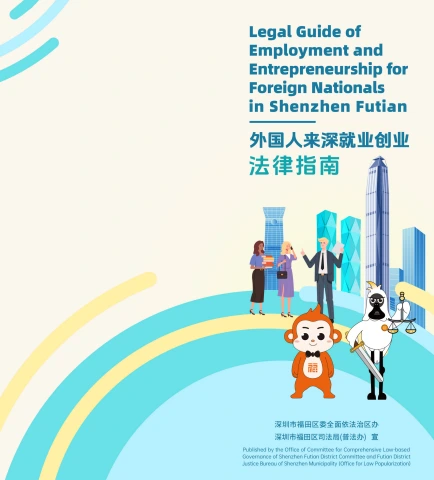

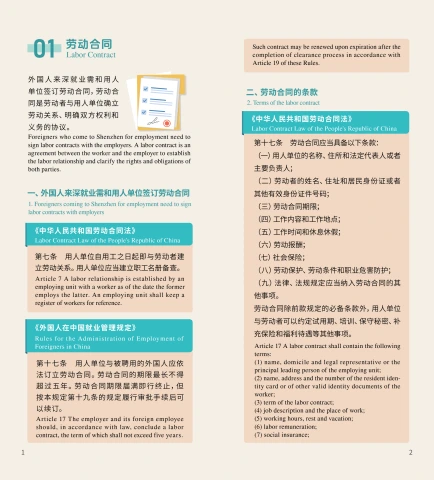
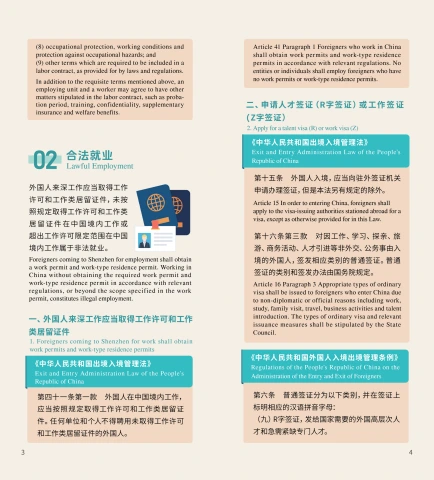

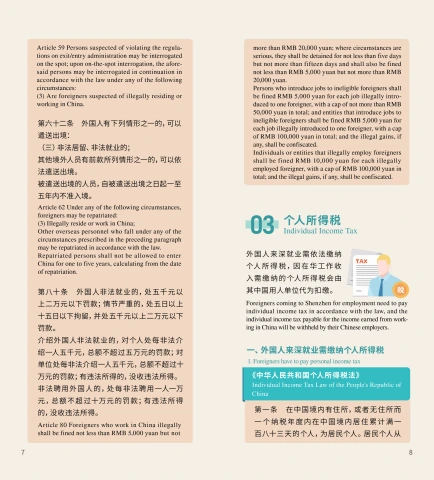
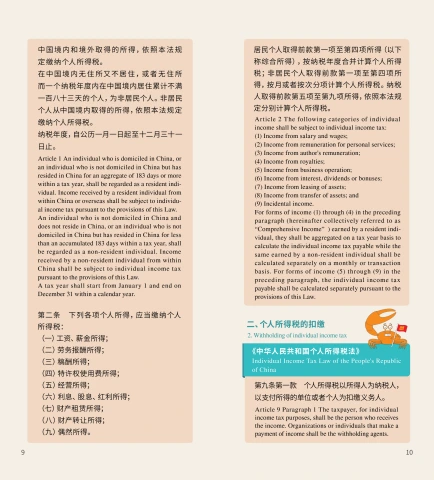
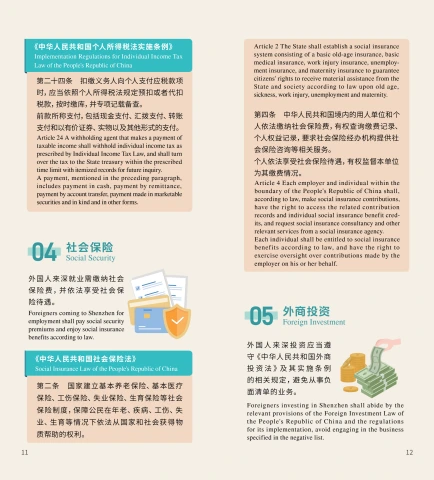

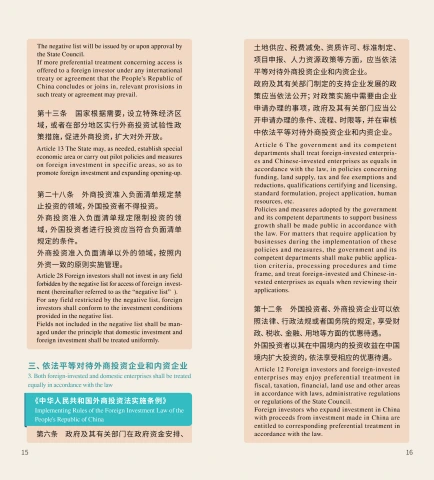
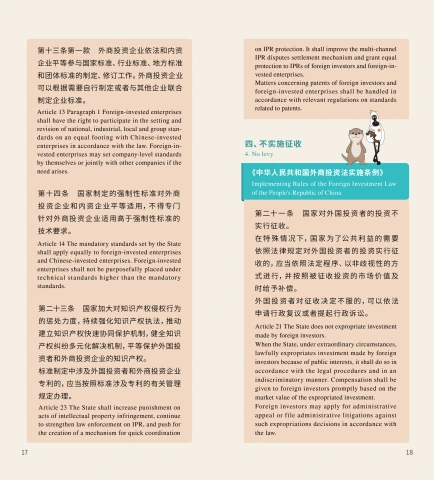
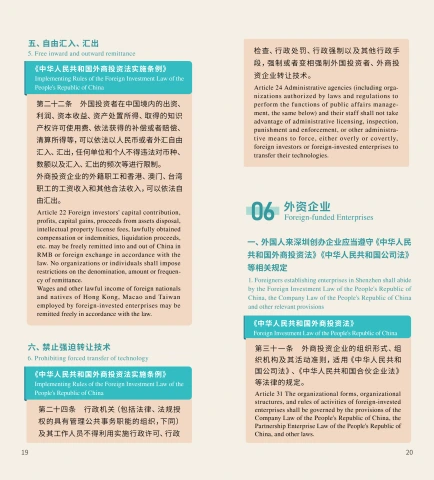

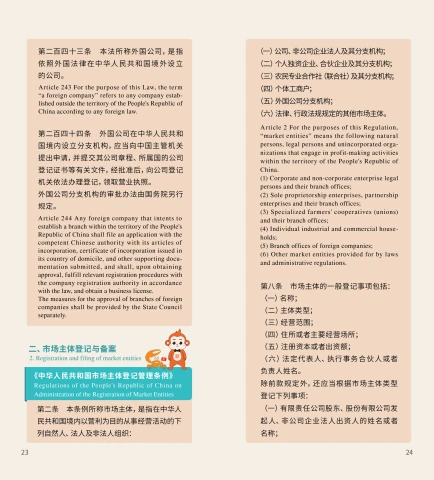
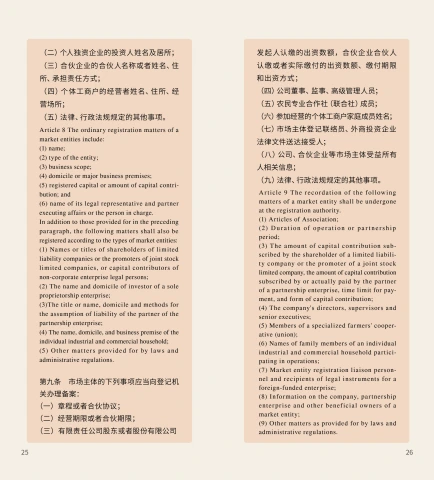
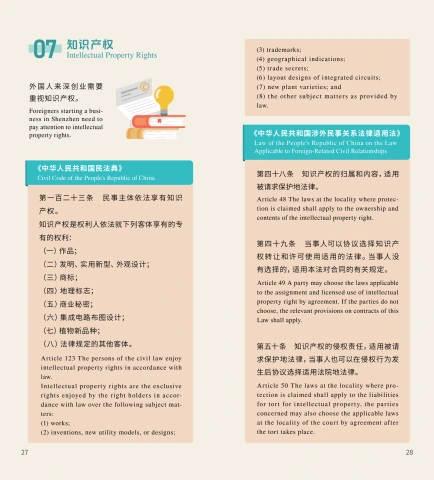
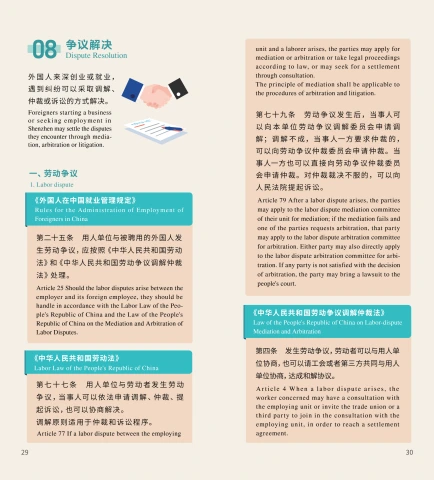

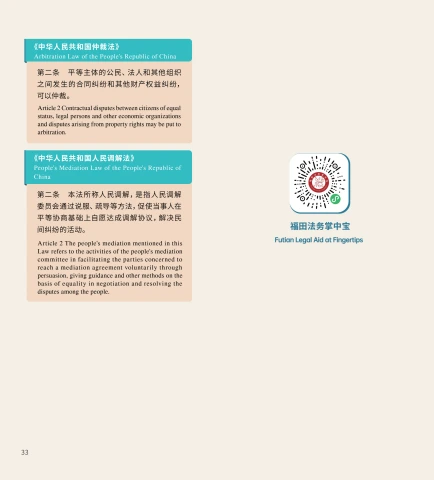
 该页无缩略图
该页无缩略图



